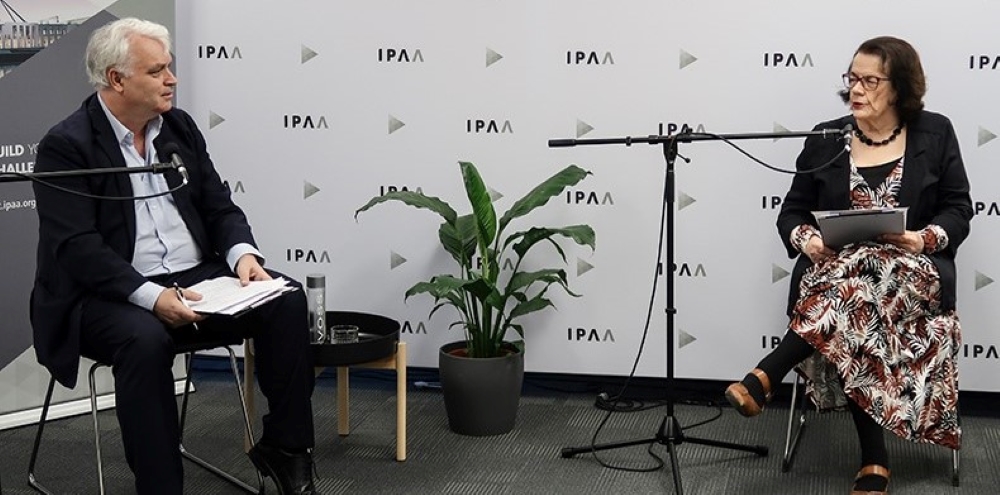COVID-19: A Collaborative Approach to Problem Solving Sets Australia Apart

Professor Mark Evans in conversation with Michelle Grattan AO
Michelle Grattan AO and Professor Mark Evans recently discussed the issue of trust in government — touching on the role of the National Cabinet and the impacts on public policy that are here to stay — for the Work with Purpose podcast.
Public Trust
The seminal definition for defining political trust is that used by the American political scientist, Marc Hetherington: “Keeping promises and agreements, and thereby holding positive perceptions about people in government, and their actions”.
In his work for Democracy 2025, Mark has been asking Australian what trust means to them for the last three years.
“They emphasise very similar things.
They emphasise the importance of politicians having integrity, being honest, open and transparent.
They emphasise the importance of empathy — that politicians should care about the issues that they care about and they should respect their views.
They emphasise the importance of delivery — this is the … ‘not breaking promises’ issue, but actually it’s a little bit more than that. They expect people to change their minds about issues, because of course in their everyday lives they change their decisions all the time. But they expect politicians to explain why they’ve changed their minds.
…
There’s an expectation for loyalty from government, that ‘politicians should have their back’. They should look after Australian citizens.”
Public trust is not static, it changes over time.
Mark outlined the decline in public trust in Australia:
“… since the end of the Howard period, there’s been over a decade of decline in public trust.
And essentially, we’ve seen public trust decline from 43 per cent in 2007, to 25 per cent last year.
And alongside that, there’s been a corresponding decline in trust in political institutions, and the media, and in particularly political parties.”
And he remarked on the recent surge in trust:
“… astonishingly, since COVID-19, trust in people in government has literally doubled. It now stands at 54 per cent.
Trust in the Australian Public Service has increased from 39 per cent to 54 per cent.
So in a very, very short period of time, trust — particularly trust in executive government, in Commonwealth Government — has increased very significantly.”
Two recent surveys on trust in times of coronavirus compared the views of Australian citizens with the views of citizens in the United States, in Italy, and in the United Kingdom. Mark observed that what set Australia apart has been “the belief that Australia has engaged in much more of a collaborative approach in terms of problem solving”.
The National Cabinet
Michelle drew attention to the role of the National Cabinet:
“I think the institution of the National Cabinet, which the Prime Minister put together early in the crisis, has been a unifying factor, even though there have been some very sharp divisions, and increasing divisions, of course over the borders, which are now fading out again as the borders are staring to come down.
But it managed the dissent and division effectively, it was an instrument that pushed for consensus, but accepted that in our federation, when so much of the power rested with the states, that the differences had to be — to some extent — accepted and managed. So I think that was a reinforcing factor on trust.”
And she observed:
“… certainly for COAG it’s been a very positive development, and of course arose out of the fact that Scott Morrison realised that the Federal Government lacked power over some of these areas, over many of these areas, and he was — in a sense — dealing himself into a position where he had maximum clout to handle the crisis. And he’d learnt about this lack of power very harshly during the bushfires when the power rested mainly with the states.”
The public policy impacts that are here to stay
Asked what she thought that about the COVID impacts and which were here to stay in terms of how public policy is done in Australia, Michelle made the following observations:
“I think that the use of expertise, the evidence-based policy, has been given a boost. And it’s not necessarily a transformation, but people have become more aware of the importance of that, and that will be some sort of legacy.
I think the way we do work and that business operates, there’ll be changes there, that things will go back to a different normal — people working from home, and less travel, and that sort of thing will be something that’s lasting.”
And she also observed that:
“The relationship between the Commonwealth and the states, I think will be changed by the crisis, but it’s not quite clear the shape that change will take so far”.
WORK WITH PURPOSE is produced in partnership between contentgroup and IPAA ACT, with the support of the Australian Public Service Commission.
The podcast can be accessed from the link below and is also available on Spotify, SoundCloud and iTunes.
